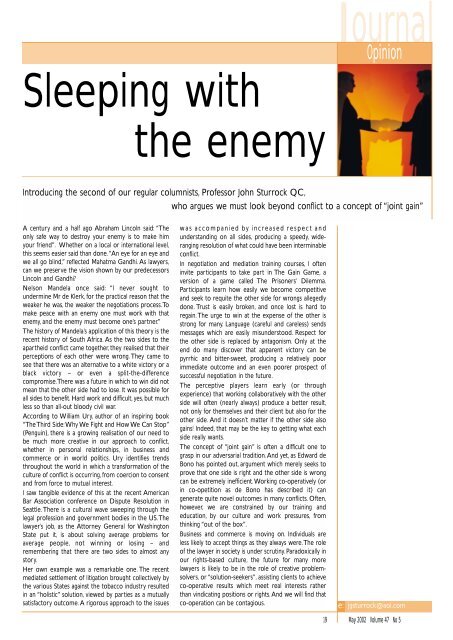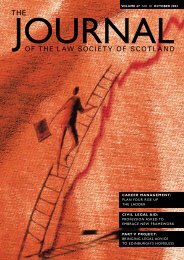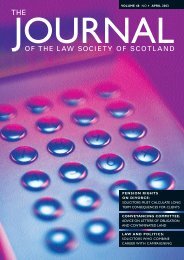OF THE LAW SOCIETY OF SCOTLAND - The Journal Online
OF THE LAW SOCIETY OF SCOTLAND - The Journal Online
OF THE LAW SOCIETY OF SCOTLAND - The Journal Online
You also want an ePaper? Increase the reach of your titles
YUMPU automatically turns print PDFs into web optimized ePapers that Google loves.
Sleeping with<br />
the enemy<br />
<strong>Journal</strong><br />
Opinion<br />
Introducing the second of our regular columnists, Professor John Sturrock QC,<br />
who argues we must look beyond conflict to a concept of “joint gain”<br />
A century and a half ago Abraham Lincoln said: “<strong>The</strong><br />
only safe way to destroy your enemy is to make him<br />
your friend”. Whether on a local or international level,<br />
this seems easier said than done.“An eye for an eye and<br />
we all go blind,” reflected Mahatma Gandhi. As lawyers,<br />
can we preserve the vision shown by our predecessors<br />
Lincoln and Gandhi?<br />
Nelson Mandela once said: “I never sought to<br />
undermine Mr de Klerk, for the practical reason that the<br />
weaker he was, the weaker the negotiations process.To<br />
make peace with an enemy one must work with that<br />
enemy, and the enemy must become one’s partner.”<br />
<strong>The</strong> history of Mandela’s application of this theory is the<br />
recent history of South Africa. As the two sides to the<br />
apartheid conflict came together, they realised that their<br />
perceptions of each other were wrong. <strong>The</strong>y came to<br />
see that there was an alternative to a white victory or a<br />
black victory – or even a split-the-difference<br />
compromise.<strong>The</strong>re was a future in which to win did not<br />
mean that the other side had to lose. It was possible for<br />
all sides to benefit. Hard work and difficult, yes, but much<br />
less so than all-out bloody civil war.<br />
According to William Ury, author of an inspiring book<br />
“<strong>The</strong> Third Side:Why We Fight and How We Can Stop”<br />
(Penguin), there is a growing realisation of our need to<br />
be much more creative in our approach to conflict,<br />
whether in personal relationships, in business and<br />
commerce or in world politics. Ury identifies trends<br />
throughout the world in which a transformation of the<br />
culture of conflict is occurring, from coercion to consent<br />
and from force to mutual interest.<br />
I saw tangible evidence of this at the recent American<br />
Bar Association conference on Dispute Resolution in<br />
Seattle. <strong>The</strong>re is a cultural wave sweeping through the<br />
legal profession and government bodies in the US.<strong>The</strong><br />
lawyer’s job, as the Attorney General for Washington<br />
State put it, is about solving average problems for<br />
average people, not winning or losing – and<br />
remembering that there are two sides to almost any<br />
story.<br />
Her own example was a remarkable one. <strong>The</strong> recent<br />
mediated settlement of litigation brought collectively by<br />
the various States against the tobacco industry resulted<br />
in an “holistic” solution, viewed by parties as a mutually<br />
satisfactory outcome. A rigorous approach to the issues<br />
was accompanied by increased respect and<br />
understanding on all sides, producing a speedy, wideranging<br />
resolution of what could have been interminable<br />
conflict.<br />
In negotiation and mediation training courses, I often<br />
invite participants to take part in <strong>The</strong> Gain Game, a<br />
version of a game called <strong>The</strong> Prisoners’ Dilemma.<br />
Participants learn how easily we become competitive<br />
and seek to requite the other side for wrongs allegedly<br />
done. Trust is easily broken, and once lost is hard to<br />
regain. <strong>The</strong> urge to win at the expense of the other is<br />
strong for many. Language (careful and careless) sends<br />
messages which are easily misunderstood. Respect for<br />
the other side is replaced by antagonism. Only at the<br />
end do many discover that apparent victory can be<br />
pyrrhic and bitter-sweet, producing a relatively poor<br />
immediate outcome and an even poorer prospect of<br />
successful negotiation in the future.<br />
<strong>The</strong> perceptive players learn early (or through<br />
experience) that working collaboratively with the other<br />
side will often (nearly always) produce a better result,<br />
not only for themselves and their client but also for the<br />
other side. And it doesn’t matter if the other side also<br />
gains! Indeed, that may be the key to getting what each<br />
side really wants.<br />
<strong>The</strong> concept of “joint gain” is often a difficult one to<br />
grasp in our adversarial tradition. And yet, as Edward de<br />
Bono has pointed out, argument which merely seeks to<br />
prove that one side is right and the other side is wrong<br />
can be extremely inefficient.Working co-operatively (or<br />
in co-opetition as de Bono has described it) can<br />
generate quite novel outcomes in many conflicts. Often,<br />
however, we are constrained by our training and<br />
education, by our culture and work pressures, from<br />
thinking “out of the box”.<br />
Business and commerce is moving on. Individuals are<br />
less likely to accept things as they always were.<strong>The</strong> role<br />
of the lawyer in society is under scrutiny. Paradoxically in<br />
our rights-based culture, the future for many more<br />
lawyers is likely to be in the role of creative problemsolvers,<br />
or “solution-seekers”, assisting clients to achieve<br />
co-operative results which meet real interests rather<br />
than vindicating positions or rights. And we will find that<br />
co-operation can be contagious. jgsturrock@aol.com<br />
e:<br />
19 May 2002 Volume 47 No 5










